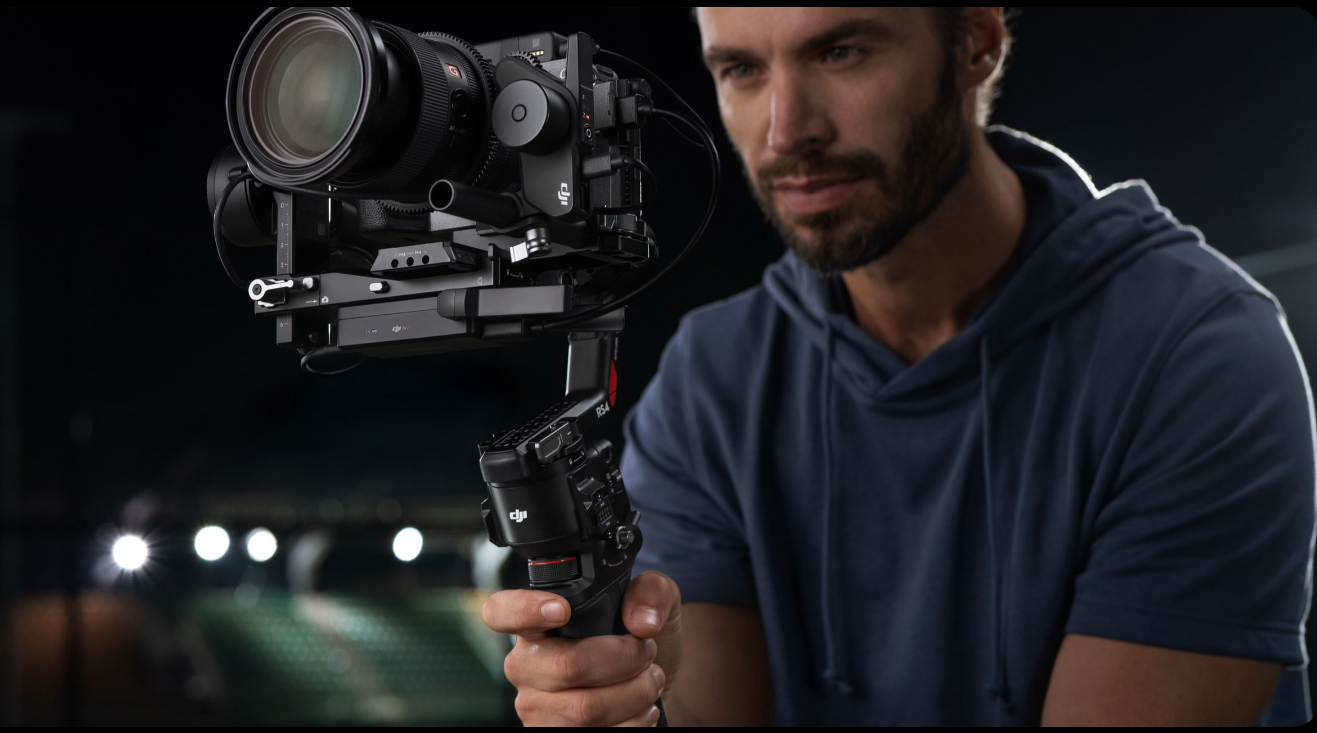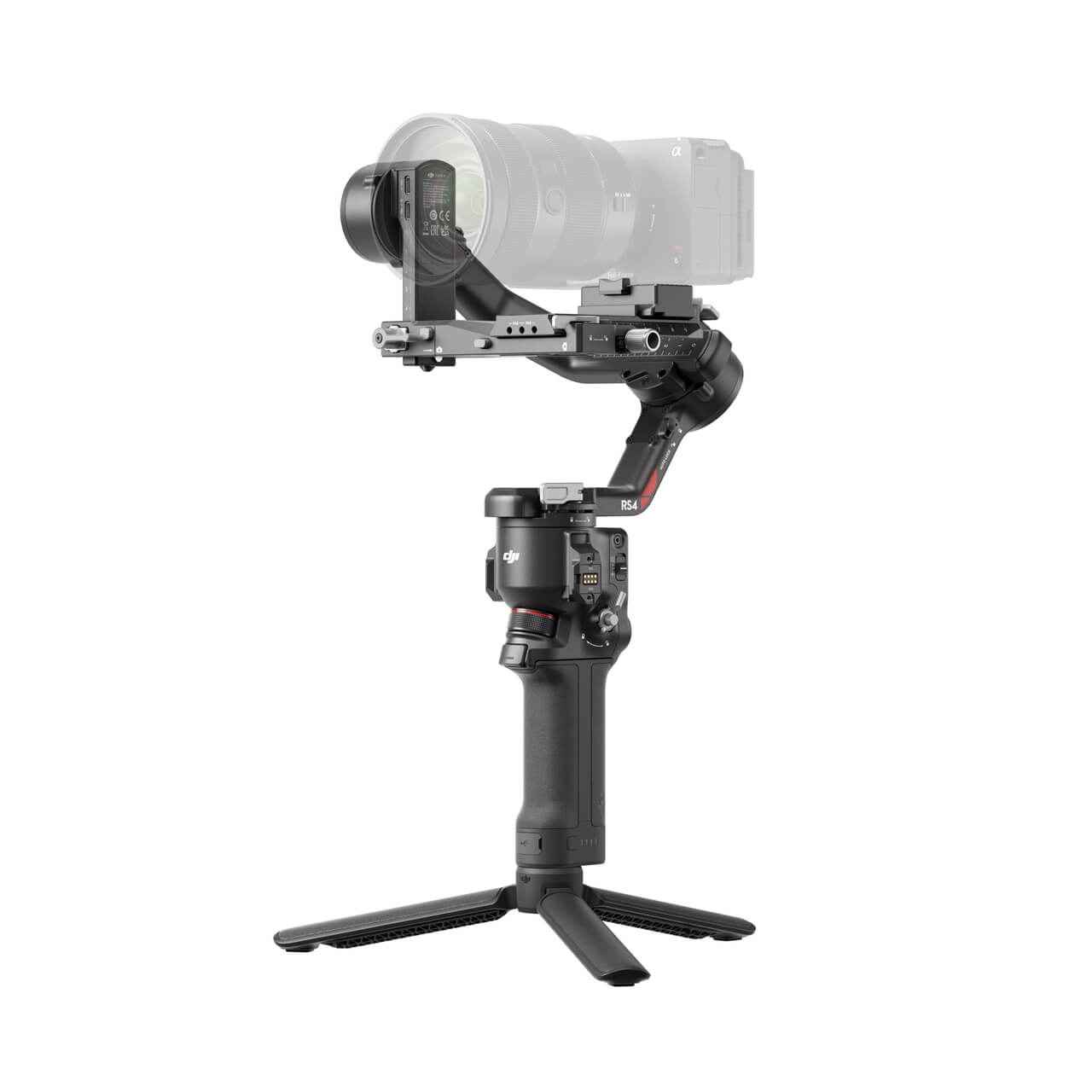DJI RS 4 Gimbal Stabilizer
Key Features
- Lightweight Design with 6.6 lb Payload
- OLED Touchscreen with Auto Lock
- 2nd Gen Native Vertical Shooting
- Automated Axis Locks
- Joystick or Bluetooth Mode Switching
- Supports Wireless Image Transmitter
- Teflon-Coated Axes
- 12-Hour Operation Time
KSh59,499.00 KSh68,999.00
The DJI RS 4 lightweight commercial stabilizer supports next-generation native vertical shooting with enhanced operation efficiency, improved stabilization performance, and an upgraded accessory ecosystem. It empowers solo cinematographers with a more professional and efficient creative experience and the toolset to tell gripping visual stories.
2nd-Gen Native Vertical Shooting
3kg (6.6lbs) Payload Capacity Extended Tilt Axis

RSA Communication Port Extensive Control Ecosystem

High-Capacity Battery Grip Approx. 2.5x Battery Runtime [1]

Quick Launch
2nd-Gen Native Vertical Shooting
DJI RS 4 features a newly designed horizontal plate, enabling the second generation of native vertical shooting for faster and simpler operation. Without the need for additional accessories, you can simply release the horizontal plate and secure it into the vertical position for an easy switch to vertical shooting. [2]
2nd-Gen Automated Axis Locks
The automated axis locks allow RS 4 to quickly start working or enter sleep mode, significantly enhancing shooting, transition, and storage efficiency. Additionally, the axis locks have smaller gaps when locked, further reducing gimbal shake.
Our Smoothest Balancing Experience Yet
DJI RS 4 features a Teflon™ coating for all three axes, resulting in reduced friction and smoother balancing.

When switching cameras or lenses, the fine-tuning knob on the tilt axis can move the camera forward or backwards, achieving precise, millimeter-level balancing.
The upper quick-release plate has an added adjustable placement guide to ensure secure camera mounting.
Automatic Screen Lock
The OLED touchscreen incorporates a new auto-lock feature. Once locked, the screen will display the current gimbal and joystick modes at a low brightness. This not only prevents accidental touches but also helps to conserve battery power.
Get a feel for what it’s like to own DJI RS 4 in advance.

Powerful Stabilization
Excellent Payload Capacity
The lightweight body boasts a 3kg (6.6lbs) payload capacity. It can carry mainstream mirrorless camera and lens combinations, enabling comfortable holding with robust power.
Compared with the previous generation, RS 4’s tilt axis has been extended by 8.5 mm, offering expanded balancing space. This allows you to mount mainstream mirrorless camera and lens combinations along with accessories like ND filters, broadening the scope for creative potential.

4th-Gen RS Stabilization Algorithm
DJI has comprehensively optimized the next-generation RS stabilization algorithm for different usage scenarios. It strikes a superior balance between stabilization strength and the tactile feel of camera movement, delivering both excellent performance and an enhanced user experience. Additionally, RS 4 offers significantly improved stability when vertical shooting, easily steadying dynamic shots like running or low-angle perspectives.
Professional Creation
DJI RS 4 supports the professional-grade features of DJI PRO products, delivering superior performance that makes solo creation more efficient.
Bluetooth Wireless Control
DJI RS 4 can remotely control camera shutter and lens zoom with Dual-Mode Bluetooth technology. In zoom control mode, you can use the joystick to control Power Zoom for PZ lenses and Clear Image Zoom, [3] obtaining a native zoom experience. A camera only needs to be paired once, after which it can reconnect seamlessly and automatically.
Support for DJI Focus Pro Motor
When paired with the new DJI Focus Pro Motor, [4] DJI RS 4 allows you to control the lens focus via dial or adjust the lens zoom via joystick. This smooth operation enables efficient lens control.
Trigger Function Customization

The trigger function can be customized to FPV mode, where pressing and holding the trigger makes the gimbal’s three axes follow the direction of the grip’s movement. This is particularly useful for shooting rotational footage or simulating POV.
Gimbal Mode Switch

By toggling the gimbal mode switch, you can quickly switch between PF, PTF, and FPV modes. You can also set FPV mode to 3D Roll 360 mode or Custom mode according to the shooting requirements, ensuring RS 4 is precision-ready.
Intelligent Features
Motionlapse
Accessory Ecosystem
RSA Communication Port
DJI RS 4 introduces an RSA communication port, which allows for the connection of accessories such as the DJI RS Tethered Control Handle [6] and third-party accessories like control handles [6] and remote-control ring handles. [6] You can flexibly switch between different shooting setups according to your creative needs.
Thanks to DJI RS SDK protocol, third-party manufacturers and individual developers can develop customized functions for RS 4, meeting a wider range of shooting requirements.
DJI RS BG70 High-Capacity Battery Grip
The new BG70 High-Capacity Battery Grip [6] can extend RS 4’s battery runtime to 29.5 hours. [7] It also supports powering your camera and accessories with up to 18 W via the USB-C port at the bottom.
Support for DJI Ronin Image Transmitter
 Both independent cinematographers and small crews can utilize the DJI Ronin Image Transmitter [6] for high-definition live feeds, remote gimbal and camera control, ActiveTrack 4.0, Force Mobile, and more, achieving an integrated shooting experience with monitoring and control capabilities.
Both independent cinematographers and small crews can utilize the DJI Ronin Image Transmitter [6] for high-definition live feeds, remote gimbal and camera control, ActiveTrack 4.0, Force Mobile, and more, achieving an integrated shooting experience with monitoring and control capabilities.
Extensive Accessory Ecosystem
DJI RS series accessories, [6] such as the RS BG30 Battery Grip, RS Focus Motor (2022), and Ronin Image Transmitter, are all compatible with RS 4.
DJI RS BG30 Battery Grip

The DJI RS BG30 Battery Grip can power RS 4 for approximately 14 hours. [7] It supports PD and QC 2.0 fast charging protocols. With a 24W charging specification, it can be charged to approximately 80% in 1 hour and fully charged in 1.5 hours, and can be charged separately from the gimbal.
DJI RS Tethered Control Handle

In the dual-grip configuration (used with the Twist Grip Dual Handle), the handle supports operations such as entering sleep mode, recording, and focusing. Equipped with a NATO port and a cold shoe, it allows for mounting a remote monitor and adding a focus wheel on the side.
DJI RS Twist Grip Dual Handle

The handle features NATO ports and a quick-release design. It allows for swift transitions from dual-handheld to low-angle briefcase configurations without the need for disassembly. It is compatible with accessories that have the corresponding ports.
DJI Ronin Image Transmitter

It supports high-definition live feeds, remote gimbal and camera control, ActiveTrack 4.0, Force Mobile, and many other features, providing an integrated monitoring and control experience for solo cinematographers and small crews.
Gripping Storytelling
- 2nd-Gen Native Vertical Shooting
- Joystick Mode Switch for Zoom/Gimbal Control
- Teflon™-Coated Axis Arms for Smoother Balancing
- 3kg (6.6lbs) Payload Capacity With Extended Tilt Axis
- RSA Communication Port for Extensive Control Ecosystem
- High-Capacity Battery Grip for Approx. 2.5x Battery Runtime
In the Box
-
 Gimbal × 1
Gimbal × 1 -
 BG21 Battery Grip × 1
BG21 Battery Grip × 1 -
 Quick-Release Plate (Arca-Swiss/Manfrotto) × 1
Quick-Release Plate (Arca-Swiss/Manfrotto) × 1 -
 Extended Grip/Tripod (Plastic)× 1
Extended Grip/Tripod (Plastic)× 1 -
 Lens-Fastening Support× 1
Lens-Fastening Support× 1 -
 USB-C Charging Cable (40 cm)× 1
USB-C Charging Cable (40 cm)× 1 -
 Multi-Camera Control Cable (USB-C, 30 cm) × 1
Multi-Camera Control Cable (USB-C, 30 cm) × 1 -
 Screw Kit × 1
Screw Kit × 1 -
 DJI Logo Sticker × 1
DJI Logo Sticker × 1
Peripheral
-
Accessory Port
-
Ronin Series Accessories (RSA)/NATO Ports
1/4″-20 Mounting Hole
Cold Shoe
Video Transmission Port (USB-C)
RSS Camera Control Port (USB-C)
Focus Motor Port (USB-C)
-
Battery
-
Model: BHX711-3000-7.2V
Type: LiPo 2S
Capacity: 3000 mAh
Energy: 21 Wh
Max Runtime: 12 hours (Measured with the gimbal balanced in a level and stationary state. When the gimbal is in motion, the operating time will be reduced.)
Charging Time: Approx. 2.5 hours (Measured with a charger supporting 18W fast charging. It is recommended to use chargers supporting PD protocol.)
Suggested Charging Temperature: 5° to 40° C (41° to 104° F)
-
Connections
-
Bluetooth 5.1
Charging Port (USB-C)
-
Ronin App Requirements
-
iOS 11.0 or above
Android 8.0 or above
-
Languages Supported by the Touchscreen
-
English, Simplified Chinese, Traditional Chinese, German, French, Korean, Japanese, Spanish, Portuguese (Brazil), Russian, Thai
Working Performance
-
Tested Payload
-
3 kg (6.6 lbs)
-
Maximum Controlled Rotation Speed
-
Pan: 360°/s
Tilt: 360°/s
Roll: 360°/s
-
Mechanical Range
-
Pan Axis: 360° continuous rotation
Roll Axis: -95° to +240°
Tilt Axis: -112° to +214°
Mechanical & Electrical Properties
-
Operating Frequency
-
2.400-2.4835 GHz
-
Bluetooth Transmitter Power
-
< 8 dBm
-
Operating Temperature
-
-20° to 45° C (-4° to 113° F)
-
Weight
-
Gimbal: Approx. 1066 g (2.35 lbs)
Grip: Approx. 203 g (0.45 lbs)
Extended Grip/Tripod (Plastic): Approx. 183 g (0.4 lbs)
Upper and Lower Quick-Release Plates: Approx. 98 g (0.22 lbs)
-
Dimensions
-
Folded: 245×255×75 mm (L×W×H, excluding camera, grip, and the Extended Grip/Tripod)
Unfolded: 370×191×189 mm (L×W×H, height includes grip and excludes the Extended Grip/Tripod)
DJI Ronin Image Transmitter
-
Connections
-
Power/Communication Port (USB-C)
HDMI Port (Mini HDMI)
RSS Camera Control Port (USB-C)
-
Expansion Port
-
Cold Shoe
-
Operating Frequency
-
2.400-2.4835 GHz
5.725-5.850 GHz
-
Weight
-
126 g (0.27 lbs)
-
Dimensions
-
82×63×24 mm (L×W×H)
-
Transmitter Power (EIRP)
-
2.400-2.4835 GHz:
< 25 dBm (FCC)
< 20 dBm (CE/SRRC/MIC)5.725-5.850 GHz:
< 25 dBm (FCC/SRRC)
< 14 dBm (CE)
-
Battery
-
Capacity: 2970 mAh
Compatible Charger: 5 V/2 A
Charging Time: Approx. 2.5 hours
Operating Time: Approx. 3.5 hours
-
Transmission Range
-
200 m (SRRC/FCC)
100 m (CE)Measured in an unobstructed environment free of interference.
-
Latency
-
60 ms
-
Operating Current/Voltage
-
900 mA/3.7 V
-
Operating Temperature
-
0° to 45° C (32° to 113° F)

















